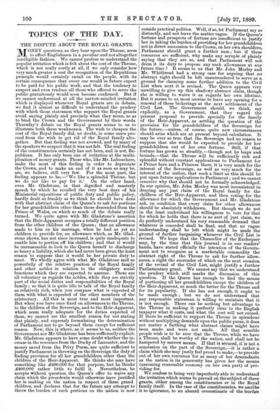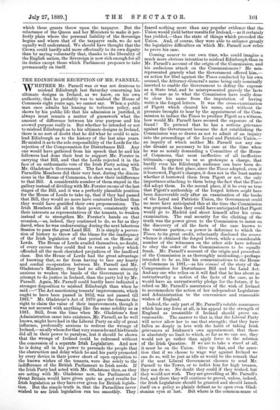TOPICS OF THE DAY.
THE DISPUTE ABOUT THE ROYAL GRANTS.
MONEY questions, as they bear upon the Throne, seem to affect Englishmen in a peculiar and not altogether intelligible fashion. We cannot profess to understand the popular irritation which is felt about the cost of the Throne, which is not really costly at all, if we only consider how very much greater a cost the recognition of the Republican principle would certainly entail on the people, with its certain consequence that every one would in future expect to be paid for his public work, and that the tendency to suspect and even traduce all those who offered to serve the _ public gratuitously would. soon become confirmed. But if we cannot understand at all the narrow-minded irritation which is displayed whenever Royal grants are in debate, we find it almost as difficult to understand the prudery with which those statesmen who support the Royal grants avoid saying plainly and precisely what they mean, so as to bind the Crown and the Government by their words. Thursday's debate on the Royal grants seems to us to illustrate both these weaknesses. The wish to cheapen the cost of the Royal family did, no doubt, in some cases pro- ceed from the wish to get rid of the Royal family alto- gether. But that feeling was not avowed, and by many of the speakers we suspect that it was not felt. The real feeling of the constituencies certainly has not been, and is not, Re- publican. It has only been one of irritation at the multi- plication of money grants. Those who, like Mr. Labouchere, make the most of this feeling in order to depreciate the Crown, and to make an end of it as soon as may be, are, we believe, still very few. For the most part, the feeling appears to be,—' We like a splendid Throne, but we do not like to pay for it.' On the other hand, even Mr. Gladstone, in that dignified and masterly speech by which he recalled the very best days of his Ministerial expositions of public duty and public policy, hardly dealt as frankly as we think he should have done with that abstract claim of the Queen's to ask for portions for her grandchildren other than those descended from the , Prince of Wales, on which so much of the debate really turned. We quite agree with Mr. Gladstone's assertion that the Heir-Apparent occupies a totally different position from the other children of the Queen ; that an allowance made to him on his marriage, when he had as yet no children to provide for, an allowance which, as Mr. Glad- stone shows, has not since increased, is quite inadequate to enable him to portion off his children ; and that it would be unreasonable to look to the Queen herself to discharge so heavy a liability, which she had never been given the least reason to suppose that it would be her private duty to meet. We wholly agree with what Mr. Gladstone said so powerfully of the relative position of the Royal family and other nobles in relation to the obligatory social functions which they are expected to assume. These are all voluntary as regards the nobles, while they are strictly part of the social duties and responsibilities of the Royal family ; so that it is quite idle to talk of the Royal family as relatively rich, when you compare what is expected of them with what is expected of the other members of the aristocracy. All this is most true and most important. But when you have once fixed on allowances to the Throne, to the children of the Sovereign, and to the Heir-Apparent, which seem really adequate for the duties expected of them, we cannot see the smallest reason for not stating that plainly, and expressly formulating the determination of Parliament not to go beyond them except for sufficient reason. Now, this is where, as it seems to us, neither the Government nor Mr. Gladstone has been sufficiently explicit. Mr. Gladstone appears to have some doubt whether the in- crease in the revenues from the Duchy of Lancaster, and the money saved from the Privy Purse, are quite sufficient to justify Parliament in throwing on the Sovereign the duty of finding provision for all her grandchildren other than the children of the Heir-Apparent. He thinks she may have something like .R.400,000 for that purpose, but he thinks £400,000 rather little to fulfil it. Nevertheless, he accepts without question, the Queen's offer to waive any claim which the precedents would otherwise have justified her in making on the nation in respect of these grand children, and declares that for the future any attempt to throw the burden of such portions on the nation is now outside practical polities. Well, if so, let Parliament say so distinctly, and not leave the matter vague. If the Queen's fortune and prospects of fortune are insufficient to justify her in taking the burden of providing for her grandchildren not in direct succession to the Crown, on her own shoulders, Parliament should grant a further sum ; but if these resources are sufficient, why make any scruple of plainly saying that they are so, and that Parliament will not deem it its duty to propose any such allowances at any future time ? It seems to us that Mr. John Morley and Mr. Whitbread had a strong case for arguing that no abstract right should be left unsurrendered to serve as a ground for claiming some further addition to the Civil List when next it is revised. The Queen appears very unwilling to give up this shadowy abstract claim, though she is willing to waive it as regards her own lifetime. But it seems to us most unwise to leave any opening for a. renewal of these bickerings at the next settlement of the. Civil List. The Government should, we think, say explicitly, as a Government, that they regard the present proposal to provide specially for the family of the Heir-Apparent, as settling the question of the provision for the grandchildren of the Sovereign for the future,—unless, of course, quite new circumstances should arise which are at present beyond calculation. It may be ever so true that the Sovereign had no reason to suppose that she would be expected to provide for her grandchildren out of her own fortune. Still, if that fortune has grown so steadily,—though not by leaps and bounds,—that the Throne will be sufficiently rich and splendid without constant applications to Parliament for a Prince here and a Princess there, it is very much for the interest of the Sovereign, as well as very much for the interest of the nation, that such a limit as this should be put upon future applications to Parliament ; and we cannot conceive why that should not be formally acknowledged.. In our opinion, Mr. John Morley was most inconsistent in denying any just claim of the Royal family for the children of the Heir-Apparent, and then voting for the allowance for which the Government and Mr. Gladstone ask, on condition that every claim for other allowances should be absolutely withdrawn. But though we do not in the least understand his willingness to vote for that for which he holds that there is no sort of just claim, we perfectly understand his very reasonable demand that whatever is conceded shall be final, and that no vague understanding shall be left which might be made the ground of further bargaining whenever the Civil List is revised. We hope that the Chancellor of the Exchequer may, by the time that this journal is in our readers* hands, have stated officially the intention of the Govern- ment not to recognise as a marketable commodity the abstract right of the Throne to ask for further allow- ances, a right the surrender of which on the next occasion of the revisal of the Civil List, might justify a further Parliamentary grant. We cannot say that we understand. the prudery which still marks the discussion of this. question. If the Queen has enough to find the means of portioning all her grandchildren except the children of the Heir-Apparent, so much the better for the Throne and for its popularity. If she has not enough, it ought to be made enough ; but we do not understand that any responsible statesman is willing to maintain that it is not enough. There can be nothing but advantage to the Throne in making it perfectly clear to the English taxpayer what it costs, and what the cost will not exceed. If there be sufficient to support the Throne in splendour without multiplying demands upon the public purse, it does not matter a farthing what abstract claims might have been made and were not niade. All that sensible people wish is to be sure that the Throne, while we have a Throne, shall be worthy of the nation, and shall not be hampered by narrow means. If that is secured, it is not a. concession on the part of the Sovereign,—it is rather a. claim which she may justly feel proud to make,—to provide out of her own resources for as many of her descendants as the nation in its generosity has given her the means (assuming reasonable economy on her own part) of pro- viding for.
We confess to being very imperfectly able to understand the irritation which seems to prevail on the subject of these grants, either among the constituencies or in the Royal famil7 itself. In the case of the constituencies, we ascribe it to ignorance, to an absurd overestimate of the burden which these grants throw upon the taxpayer. But, the reluctance of the Queen and her Ministers to make it per- fectly plain where the personal liability of the Sovereign begins and where that of the taxpayer ends, we do not equally well understand. We should have thought that the Crown could hardly add more effectually to its own dignity than by saying voluntarily that, thanks to the liberality of the English nation, the Sovereign is now rich enough for all its duties except those which Parliament proposes to take permanently on itself.



































 Previous page
Previous page